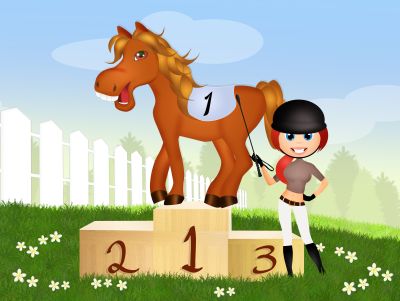
When I wrote for People Magazine in the early 1980s -- I was the publication's Arizona Correspondent -- I had the opportunity to interview comedian Milton Berle who was appearing at Buster Bonoff's Star Theater in Phoenix.
Berle was a very astute performer, a man of super intelligence who knew how to get to an audience's funny-bone. I had a stock question that I enjoyed keeping for celebrities like Berle who could name his own price and decide where he wanted to perform. The question was, 'Mr. Berle, you have been a performer for more than 50 years. If you could change one thing in your life -- undo one thing you did -- what would that be?'
Berle lit up a cigar, took a puff and said, 'I wouldn't have lost the $4 million I lost betting on the horses.'

Uncle Milty was a smart guy as well as a talented comedian. He went on to invest in thoroughbred horses and reports indicate he won most, if not all, of his money back. Still, there is no question that it's tough to be consistent in picking winners at the race track.
Horse players (and I am one of them) are constantly inventing systems to try to gain the edge on the ponies. Over the years, I have come up with scores of strategies for playing horses. Most of them turned out to be losers. Some won for a little while, and then tapered off. And then there were the miracles that more often than not ended up filling my pockets with cash. Here are a couple of the better ones to file away and which could be profitable to you.
MAIDEN RACES: If you find a first-time starter in a maiden race that has a three-furlong workout in .35 seconds or less, the horse is definitely worth a bet. If the workout had the initial 'B' rather than H' after it, that's even better.
FAVORITES THAT WERE BOTHERED IN THEIR LAST RACE: The public makes a horse the favorite. But at the break or in the stretch, the horse is blocked or interfered with in some way that was significant to the outcome. Maybe the jockey lost his whip or the horse stumbled. If the horse was bothered, it is worth a win bet.
RIDER SWITCH TO A LEADING JOCKEY: This one should be a no-brainer, but you might be surprised at how many people ignore this factor when betting on a race. A trainer does not ask a top jockey to ride his horse if the animal is just out to stretch its legs.
A SHARP DROP IN ODDS DURING THE WAGERING OR JUST BEFORE POST TIME: Betting on a horse that has this occur will make you more money than previous factors I just mentioned. The public does not bet like that. When the odds plunge on a horse, it means track money has been wagered. You bet against such a horse at a terrible risk to your bankroll.
A SECOND OR THIRD FAVORITE THAT WORKS ALONE WITHOUT A LEAD RIDER: When a horse works alone without a lead rider, it means that horse has been working well. If the horse has been bet down and this happens, it's always worth a win bet.
A HORSE WITH PERFECT BODY LANGUAGE: Your own personal observation is all that is necessary to spot such a horse. Look for the ears to be sharp and pronounced, the coat to be glistening, the neck to be arched, the hooves prancing, the tail properly upraised, and the body in apparently superb condition. All these factors mean the horse is ready to run, regardless of the odds. You can get some boxcar figures on such a horse. Good luck. Let the races begin.
Author: Geno Lawrenzi Jr.
(Geno Lawrenzi Jr. is an international journalist, magazine author and ghostwriter. If you have a unique gambling story to share with him, you may qualify for a cash award. Send your story with all the details to glawrenzi@gmail.com ).
Your feedback
Please enter your comment.
Your comment is added.




